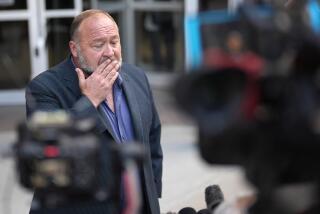Investors’ Bid to Freeze Keating Assets Fails
- Share via
A federal judge on Wednesday denied a request by investors who bought now-worthless bonds issued by Lincoln Savings & Loan’s former parent company to freeze the personal assets of Arizona businessman Charles H. Keating Jr. and his family.
U.S. District Judge Stephen V. Wilson in Los Angeles denied the preliminary injunction sought by investors in a class-action suit, saying it would be legally inappropriate for him to issue such a freeze.
But Wilson left open the possibility that investors could still seek to have the Keating family’s assets frozen in U.S. Bankruptcy Court in Phoenix, where American Continental Corp., former parent of Irvine-based Lincoln, has sought protection from creditors.
Lawyers representing investors said they would move to do that within a few days. But Keating’s lawyers claimed a victory and predicted a similar outcome in Phoenix.
“There’s nothing like looking for a silver lining around dark clouds,” said James Ham, one of Keating’s lawyers. “They did not have the facts to prove it in this court, and it will be impossible for them to prove these claims with clear and convincing evidence.”
Keating remains the head of American Continental, a Phoenix real estate development firm that has been his flagship company. American Continental filed for protection from creditors under Chapter 11 of the U.S. Bankruptcy Code in Phoenix on April 13, and regulators seized Lincoln the following day. Lincoln is expected to be the nation’s costliest thrift failure, with taxpayers picking up the tab of more than $2 billion.
About 22,000 investors are suing Keating, claiming that nearly $200 million in risky American Continental bonds they bought at 29 Lincoln branches in Southern California helped finance Keating’s lavish life style. Because Keating and his family controlled American Continental, investors’ lawyers argued, investors should have the right to go after their personal assets.
Investors allege that Keating and his family have hidden more than $100 million in overseas bank accounts. In court papers, Keating listed his assets at $7 million, but lawyer Ham said much of that amount is stock and notes now of dubious value. He said Keating’s true net worth is “about zero” and that the Arizona businessman is “up to his ears in debt.”
Keating’s lawyers argued that Keating never presented himself as being personally responsible to small investors and that investors lack the legal right to have his personal funds frozen. They also dispute claims that Keating and his family have hidden money overseas.
Lawyers for investors said they will seek in Phoenix to have Keating ousted as head of American Continental and have a trustee appointed by a bankruptcy judge. Once that is done, they said, the trustee could then seek a court order to freeze Keating’s assets.
“It doesn’t mean the issue is dead. It is unfortunate that it has to be a two-step process,” said Ronald Rus, a lawyer in Orange who represents investors.
A similar move is being taken by the Resolution Trust Corp., the federal agency created this summer to mop up the nation’s savings and loan mess. Officials from that agency last week asked a federal judge in Phoenix to oust Keating as chairman of American Continental, claiming that Keating and other company executives are depleting the remaining assets, much of it spent on legal and other fees in an effort to vindicate themselves.
In a separate development Wednesday, state thrift regulators said they would prohibit the sale of high-risk junk bonds from the offices of California’s state-chartered thrifts in the wake of the Lincoln scandal.
Junk bonds are risky and typically have high yields. Investors have complained that they bought American Continental junk bonds at Lincoln branches believing that they were putting their money in federally insured certificates of deposits.
A temporary order is expected to be issued next week by the state Savings and Loan Department. It would apply to the 108 state-chartered thrifts.
In interviews, state Savings and Loan Commissioner William Crawford and Chief Deputy Commissioner William Davis acknowledged that the order only applies to thrifts selling their own junk bonds and that they know of no institutions now selling such bonds in branches. They said their action is designed more to prevent what happened at Lincoln from happening again.
“People can misunderstand these products,” Crawford said.
In another Lincoln development, state Assemblymen Bob Epple (D-Norwalk) and Patrick Johnston (D-Stockton) announced a five-part “Lincoln Savings and Loan Reform Proposal.” It would forbid employees of financial institutions from selling in branches the securities of the company they work for. It also is designed to make sure that customers clearly know that certain products available for purchase at financial institutions are uninsured.
More to Read
Inside the business of entertainment
The Wide Shot brings you news, analysis and insights on everything from streaming wars to production — and what it all means for the future.
You may occasionally receive promotional content from the Los Angeles Times.










